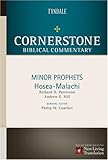
 Brief Summary
Brief Summary
Published in 1974, this is one of the first volumes in the Bible Speaks Today series. It is an 208 page exposition of the book of Amos, with a short introduction. It is subtitled, "the Day of the Lion", drawing on Amos’ striking image of God as a fearsome Lion roaring out before he pounces on his prey.
The Introduction
Amos is introduced to us as a prophet living in similar days to our own – a society of affluence, exploitation and greed for profit. It was also a religious society, yet one that didn’t really care how far standards had fallen. Amos was effectively a prophet of doom – the people assumed they had privilege and security when in fact they were in peril.
One of the key themes of the book is the importance of ‘evidences’ to accompany the claim to be God’s people. Religion is repulsive and useless if not verified by evidences. Motyer does not believe though that Amos was prophesying an end to the covenant, but rather that the curses of the covenant were coming into effect.
The Commentary
The commentary takes the form of an exposition rather than merely an exegesis of the text, and Motyer unashamedly takes Amos’ message to be directly relevant to Christians today.
As he goes through the first chapter of Amos, which starts pronouncing judgments on the foreign nations around Israel, he shows how God judges these nations according to how they have treated their fellow man, irrespective of the fact that they have not been recipients of the same special relation as Israel.
But these judgements on the surrounding nations are in fact a noose of judgment that is tightening around their own necks. Israel’s sins are revealed as covetousness, indifference, oppression and self-importance – the very same sins the surrounding nations have been condemned for.
Motyer tackles the subject of "vengeance" within the covenant – yes there are blessings associated with the covenant, but there are also curses. He cites the churches in Revelation as examples that this truth still holds valid even in the New Testament era.
On Amos 5, there is an interesting section dealing with the way the Israelites flocked to visit shrines at Bethel, Gilgal, and Beersheba. These were places that God had met with the patriarchs, and there was an almost superstitious assumption that by visiting these places, they would meet God. But they were returning from their pilgrimage unchanged. They needed to make God himself, not Bethel, their place of pilgrimage.
Ultimately, Motyer shows us that Amos is speaking to a people whose religion was simply one of self-pleasing and pretence. The lack of justice (right behaviour in respect to fellow man) in society was evidence of the shallowness of their religion.
Strengths
The main strength of this exposition is the way that the challenge of Amos’ message is taken seriously for today, both at the level of the church and for society in general. He cites global corporations forcing small local companies out of business and our lack of care for the environment as examples of the same kind of selfishness that characterised those who Amos spoke to.
Weaknesses
Not a criticism as such but, one subject that will probably raise questions in the minds of readers is the relationship between law and grace, and how this applies to those in the New Covenant. Motyer does tackle this subject, and talks of the "law of grace" and the "grace of law". It is obviously a subject on which there are a spectrum of opinions amongst Christians, but I think he maintains a good balance here that does justice to the message of Amos without ignoring the rest of the biblical witness on grace. Here is a quote concerning Amos’ vision of the plumb-line to give a flavour for his approach:
When the Lord draws near with the plumb-line … [it is] to declare condemned all who try to live by law and forget grace, to declare equally condemned those who have sought after the grace of the sacrifices but who have forgotten the righteousness and the justice of the law, but to accept all those who have constructed the fabric their lives according to the horizontal foundation of grace and according to the vertical erectness of law. The plumb-line will try such and pass them as approved.
Why Buy It?
As usual with the Bible Speaks Today series, this is well suited for those who want to personally study or teach their way through a book of the Bible. It is valuable to have the necessary background (historical, cultural, geographical etc) explained where relevant so you can properly grasp the force of the message of Amos.

Here’s my review of Andrew Hill’s commentary on Amos from Volume 10 of the Cornerstone Biblical Commentary. For those of you who are getting fed up of these, there are now just two more minor prophets to go before I move on to studying some longer books of the Bible!

